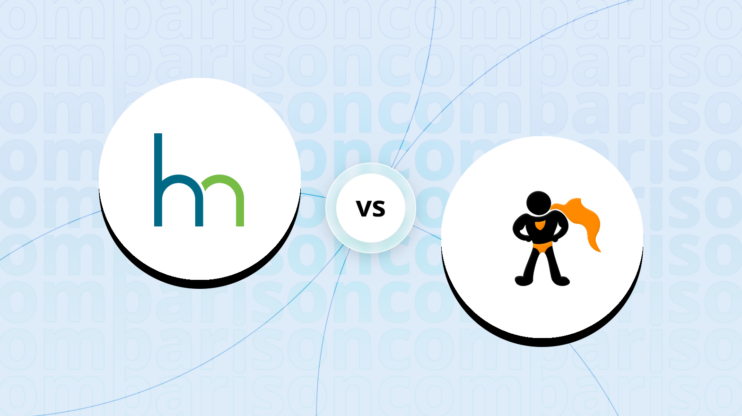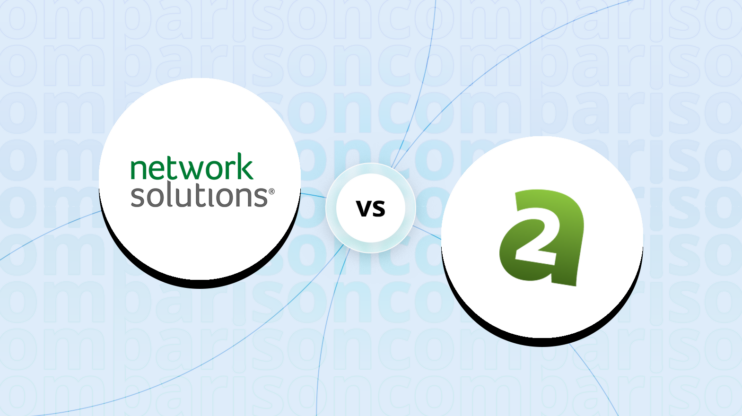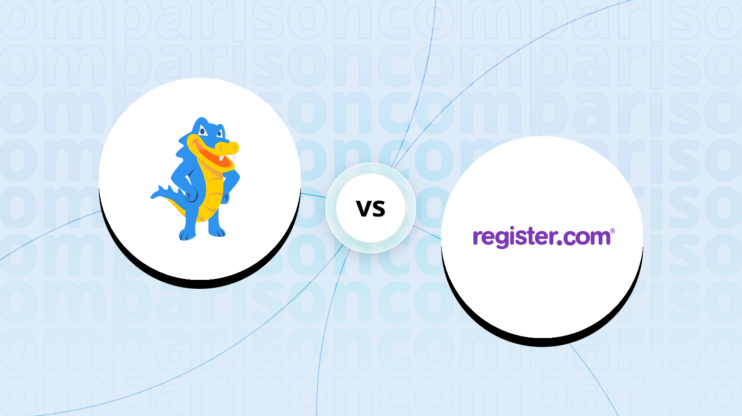Web.com vs WestHost: Final verdict
Looking over Web.com vs. WestHost, both hosting services offer a diverse range of features, yet each shines in specific areas, making them suitable for different kinds of users.
-
WestHost (Overall grade: 7.8)
stands out for its comprehensive security measures, global data centers, and diverse hosting options including cloud and VPS hosting. It caters well to high-traffic and eCommerce websites with its advanced features and near-perfect uptime. The competitive pricing, free SSL certificates, and extensive support services provide added value. However, some users report that navigating site migrations and outdated documentation can be cumbersome. Despite these minor drawbacks, WestHost excels in offering versatile hosting solutions at competitive prices, making it a strong contender for those needing reliable, scalable, and well-supported hosting.
Web.com (Overall grade: 7.3)
is a solid choice for users in need of straightforward, easy-to-use services with notable features like a drag-and-drop website builder and unmetered bandwidth. The platform offers robust customer support and significant uptime, making it reliable for maintaining site availability. However, it lacks more advanced hosting types such as VPS and dedicated hosting, which can be a limitation for users with growing or high-traffic websites. Additionally, while the initial pricing is attractive, renewal costs can be higher compared to other services. For users who seek simplicity and good support without advanced scalability needs, Web.com remains a commendable option.
 Overall grade:7.3 |
 Overall grade:7.8 |
|
|---|---|---|
| Uptime and Availability | 8.0 | 7.8 |
| Hosting Performance | 6.6 | 8.3 |
| Hosting Security | 8.2 | 8.0 |
| Price | 8.0 | 8.5 |
| Hosting Features | 4.8 | 6.5 |
| Ease Of Setup | 7.6 | 8.2 |
| User Management | 7.3 | 7.2 |
| Customer Support | 8.2 | 7.7 |
| User feedback | 4/5 | 3/5 |
Hosting types offered
Both platforms provide a variety of hosting types, each designed to meet the different needs of users.
 |
 |
|
|---|---|---|
| Shared hosting | ||
| Cloud hosting | ||
| WordPress hosting | ||
| Ecommerce hosting | ||
| VPS hosting | ||
| Dedicated hosting |
Although both offer a variety of hosting plans tailored to different needs, in
certain cases, one platform may prove to be more suitable.
Detailed comparison
Uptime and availability
Evaluates the average uptime statistics, uptime guarantee and overall availability of the hosting
provider
Score Components:
- Uptime percentage (30%): evaluates the uptime statistics in given period of time
- Uptime guarantee (20%): Assesses if the platform offers an uptime guarantee and
whether the actual uptime matches the promised guarantee. - General performance (25%): Evaluates how fast is the average response time and overall
it’s stability. - Responsiveness (10%): Adaptability to different devices and screen sizes.
- Availability (25%): Reflects the total downtime and number of outages.
 8.0
8.0
 7.8
7.8
🏆 Winner Web.com: A reliable hosting provider with solid uptime guarantees, unmetered bandwidth, and extensive customer support.

Web.com offers a 99.9% uptime guarantee and has an actual uptime of 99.83% for a monitored month. Even though there were four instances of downtime totaling 67 minutes, they back their uptime with a service level agreement. Customers can take advantage of unmetered bandwidth and SSL security, along with 24/7 support via chat, phone, email, and ticket. The automatic backups and one-click WordPress installation further simplify site management.

WestHost emphasizes security and uptime with data centers located globally, ensuring availability. Despite not having an explicit uptime guarantee, it achieved 100% uptime in a one-month monitoring period, with only a single downtime incident lasting 13 minutes. The service level agreement promises 99.995% uptime, and the average speed performance is competent. RAID-10 redundancy and physical security measures add to the service’s reliability.
Which one has better hosting performance?
Score Components:
- Hosting speed (30%): This includes SSD quality, Load times, PageSpeed score ranges,
additional information on website speed, built-in plugins for performance enhancement, available caching
methods, and CPU/RAM options - CDN (20%): Considers whether CDN is available or not, whether it’s free or paid, and
the quality of the CDN service - Available data centers (30%): Evaluates the number of data centers and their locations
globally. - Scalibility (20%): Looks at whether elastic scaling is available, the process required
to scale (manual upgrade vs. automatic scaling), the presence of dedicated servers, and the costs
associated with scaling.
 6.6
6.6
 8.3
8.3
🏆 Winner Westhost: Comprehensive security and global infrastructure for reliable hosting.
When comparing the general performance of Web.com and Westhost, several key factors come into play. Web.com offers faster hosting speeds with server response times up to 70% quicker and supports better SEO rankings, thanks to upgrades like PHP 8.0 and OPcode Cache. Westhost, however, ensures exceptional uptime at 99.995% and provides unlimited free SSL certificates through Let’s Encrypt. Westhost’s infrastructure features a global network of datacenters and high-performing SSD-based cloud hosting, bolstered by redundancy in both power supply and cooling. CDN access is included in higher-tier Westhost plans, whereas Web.com focuses more on server optimization.
Website Speed
Web.com has made notable advancements in website speed through the integration of PHP 8.0, OPcode Cache, and MySQL 8, offering up to 70% faster server responses. This greatly enhances loading times and provides a smoother user experience. Westhost counters with lightning-fast VPS cloud hosting that utilizes SSD for immediate data access and a gigabit port for rapid network performance. Both services offer robust options for speeding up content delivery, but Web.com emphasizes internal server optimizations, while Westhost leverages its high-performance cloud infrastructure.
Scalability
When it comes to scalability, Web.com supports most customers’ bandwidth demands and offers scalable solutions for those who outgrow shared architecture. Details about elastic scaling or dedicated server options for Web.com are not provided. On the other hand, Westhost provides flexible VPS hosting packages that allow for easy upgrades to meet growing needs. Pricing varies, with VPS plans starting at $8.00/month and advancing depending on the resources required. Westhost’s approach to scalability appears more straightforward, giving users the flexibility to choose between multiple tiers based on their increasing demands.
Which one has better security features?
and regulatory requirements
Score Components:
- Technical security measures (40%): This includes encryption, firewalls, DDoS
protection, secure configurations, server monitoring, access control and availability of security addons
(e.g Sitelock security). - Operational security measures (30%): Encompasses data privacy, backups and data
redundancy. - Compliance and certifications (20%): Adherence to legal and regulatory requirements
(e.g., GDPR, HIPAA) and possession of certifications (e.g., ISO 27001, SOC 2). - Business and reliability (10%): Factors in the provider’s reputation, uptime
guarantees, and customer support.
 8.2
8.2
 8.0
8.0
🏆 Winner Web.com: Offers superior security features and more comprehensive compliance options.
Both Web.com and Westhost, have notable differences in their approaches to technical and operational security, as well as in their compliance with regulations.
Technical security measures:
Web.com provides a range of SSL certificates, from basic to extended validation, while Westhost offers unlimited free SSL certificates through Let’s Encrypt and a domain validated SSL for free for the first year with an annual plan. Web.com uses PHP 8.0, whereas Westhost supports PHP versions 5.3 to 8.2, offering more flexibility. Web.com includes CodeGuard for backups and MySQL 8 for improved performance, while Westhost offers managed security cleanup services for a fee. Both guarantee 99.9% uptime and include SiteLock for malware protection.
Operational security measures:
Web.com offers SiteLock with malware scanning and removal, CDN for faster loading, and automatic WordPress updates, ensuring security alongside performance. Westhost provides built-in virus and spam protection, FTPS, and SSH access. While both hostings ensure essential operational security, Westhost offers fraud protection and raw access logs, which give users more detailed control over their security audits.
Compliance and certifications:
Web.com complies with GDPR and PCI, ensuring thorough protection and reliability for business and eCommerce sites. In contrast, Westhost has ‘Privacy Shield’ certification under the EU – U.S. Privacy Shield framework, but users must verify compliance with their jurisdictional laws. Westhost doesn’t specify PCI compliance.
 |
 |
|
|---|---|---|
SSL certificate |
Various types available |
Unlimited free, DV SSL free for 1st year |
Additional security features |
SiteLock, CodeGuard, CDN |
SiteLock, spam & virus protection, FTPS, SSH |
PHP versions |
8.0 |
5.3 to 8.2 |
GDPR compliance |
Yes |
Yes |
HIPAA compliance |
Not specified |
Not specified |
PCI compliance |
Yes |
Not specified |
Hosting features
Score Components:
- Domains (20%): Assesses the availability of a free domain, domain purchase options, and
pricing - Email (15%): Considers if the provider offers full email hosting, or is reselling
third-party service, and if the email is only transactional or not - Website builder (15%): Checks if website builder is available, and it’s user
friendliness and overall the level of customization allowed. - Staging environment (20%): Determines if a staging environment is available, allowing
for testing changes before going live. - FTP & SFTP accounts (10%): Evaluates if and how easily users can access FTP and
SFTP accounts - Git and SSH access (20%): Assess whether Git is integrated into the hosting service and
if SSH access is provided
 4.8
4.8
 6.5
6.5
🏆 Winner
Westhost: A robust and cost-effective web hosting provider with a wide range of features tailored to various user needs.
When comparing Web.com and Westhost, several aspects stand out, particularly in how each provider approaches website building and user-friendliness. Web.com includes a drag-and-drop website builder with all its plans, which is perfect for users who want an easy, no-code option for creating sites. In terms of customization, Web.com offers flexibility but may be limiting for those seeking intricate design capabilities or specific integrations. Westhost, on the other hand, provides an application installer with 80+ free applications, supporting platforms like WordPress, Magento, and Joomla. This makes Westhost an attractive choice for users looking to build more complex, customized sites with specific functionalities.
Both providers offer a free domain for the first year, but there are some standout features unique to each. Web.com includes business email with its hosting plans, and the first year’s SSL certificate is complimentary, catering to small and medium-sized businesses in need of basic online presence tools. Meanwhile, Westhost offers SSH access and FTPS, vital for developers who require secure file transfer and terminal access to their servers. Also, Westhost has a more generous policy on external domains and a free migration service, which would appeal to users wanting to switch from another provider effortlessly. Furthermore, the unlimited file number and various free automatic SSL certificates from Westhost add significant value, making it a compelling choice for those needing extensive hosting capabilities at a lower cost.
 |
 |
|
|---|---|---|
Free domain |
Yes, for the first year |
Yes, with annual plan |
Free SSL |
Yes, for the first year |
Yes |
Email hosting |
Yes, business email |
Yes |
Website builder |
Yes |
No |
Staging environment |
Not mentioned |
Not mentioned |
FTP & SFTP accounts |
Yes, FTP only |
Yes, FTP & SFTP |
Git and SSH access |
Not mentioned |
Yes |
Free backup |
Not mentioned |
Yes |
Money back guarantee |
Not mentioned |
Yes, 30 days |
a location.
As a result in rare cases the features mentioned here can differ from the ones you see on their websites.
Both providers support a range of users from beginners to experts with user-friendly website builders and WordPress staging areas. However, in terms of developer tools, both Web.com and Westhost offer robust options including SSH access, support for multiple programming languages, and Git for version control, thus appealing to developers looking for advanced capabilities.
Email services:
Email services at Web.com are provided through a partnership with Microsoft 365, offering a professional email and access to Outlook on a trial basis before transitioning to a paid service. Conversely, Westhost provides unlimited free professional email accounts, which is particularly beneficial for users requiring multiple email accounts without incurring additional costs.
Price
Score Components:
- Plan value (40%): What each pricing tier offers.
- Transparency and clarity (30%): Clearness of pricing structures.
- Flexibility of plans (20%): Range of options to suit different budgets.
- Hidden costs (10%): Additional expenses not included in the plan.
 8.0
8.0
 8.5
8.5
🏆 Winner Westhost: Westhost provides a varied array of hosting plans with impressive features at competitive prices, making it a top choice for many customers.
Evaluating the pricing of plans among various hosting providers can be complex due to their differing pricing and renewal strategies. Additionally, certain plans require annual commitments, which adds to the difficulty of making comparisons. The prices listed are based on monthly commitments; plans requiring annual commitments are indicated. Additionally, although some providers offer identical plans for WordPress and shared hosting, we have created separate tables for each to enhance clarity.
Both Web.com and Westhost offer a comprehensive range of plans catering to different needs. Web.com has introductory prices ranging from $2.75 to $6.95 per month, which increase upon renewal. Their plans include features like free domains, business email, and SSL certificates on select plans. Westhost, on the other hand, has competitively priced plans starting at $3.75 with robust storage, email options, and unlimited SSL certificates. Westhost’s pricing strategy, coupled with features like the StackCP site builder, CDN, and broader storage options, give it a compelling value proposition, making it a preferred choice in this comparison.

|

|
|---|---|
|
Basic WordPress Plan$9.99
1 Website, 10GB Web Storage, Unmetered Bandwidth, Free Domain, Business Email
Value for price:6.5
|
N/A |
|
Plus WordPress Plan$13.99
5 Websites, 20GB Web Storage, Unmetered Bandwidth, Free Domain, SSL Certificate, Business Email
Value for price:7.0
|
N/A |
|
Premium WordPress Plan$16.99
10 Websites, 40GB Web Storage, Unmetered Bandwidth, Free Domain, SSL Certificate, Business Email
Value for price:7.5
|
N/A |

|

|
|---|---|
|
Basic Plan$9.99
1 Website, 10GB Storage, Unmetered Bandwidth, Free Domain, 25 FTP Accounts, Business Email
Value for price:6.0
|
Essential Plan$5.00
1 Website, 25GB Storage, Unmetered Bandwidth, Free Domain, 10 x 1GB Databases, 25 Subdomains, 1 x 10GB Mailbox, Backups
Value for price:8.0
|
|
Plus Plan$13.99
5 Websites, 20GB Storage, Unmetered Bandwidth, Free Domain, 50 FTP Accounts, SSL Certificate, Business Email
Value for price:6.5
|
Personal Plan$12.00
10 Websites, 50GB Storage, Unmetered Bandwidth, Free Domain, 25 x 1GB Databases, 100 Subdomains, 10 x 10GB Mailboxes, Backups, CDN
Value for price:8.5
|
|
Premium Plan$16.99
10 Websites, 40GB Storage, Unmetered Bandwidth, Free Domain, Unlimited FTP Accounts, SSL Certificate, Business Email
Value for price:7.0
|
Professional Plan$16.00
25 Websites, 75GB Storage, Unmetered Bandwidth, Free Domain, 50 x 1GB Databases, Unlimited Subdomains, 25 x 10GB Mailboxes, Backups, CDN
Value for price:8.5
|

|

|
|---|---|
|
Cloud 1$29.99*
1 Website, 100% Network Uptime, 10GB SSD Storage, 2vCPU Compute Power, 24/7 Priority Support Voice Chat
Value for price:7.2
|
Jump Start$100
4 CPU Cores, 8GB Memory, 40GB SSD Space, 5TB Data Transfer
Value for price:7.8
|
|
Cloud 10$49.99*
10 Websites, 100% Network Uptime, 125GB SSD Storage, 20vCPU Compute Power, 24/7 Priority Support Voice Chat
Value for price:8.7
|
Business$200
8 CPU Cores, 12GB Memory, 80GB SSD Space, 5TB Data Transfer
Value for price:8.0
|
|
Cloud 25$89.99*
25 Websites, 100% Network Uptime, 175GB SSD Storage, 75vCPU Compute Power, 24/7 Priority Support Voice Chat
Value for price:8.8
|
Business Plus$300
12 CPU Cores, 16GB Memory, 120GB SSD Space, 5TB Data Transfer
Value for price:8.3
|
|
Cloud 50$109.99*
50 Websites, 100% Network Uptime, 225GB SSD Storage, 150vCPU Compute Power, 24/7 Priority Support Voice Chat
Value for price:8.8
|
Super Power$400
16 CPU Cores, 20GB Memory, 160GB SSD Space, 5TB Data Transfer
Value for price:8.8
|
Enterprise plans
For enterprises, Web.com offers the Premium Plan, which includes 10 websites, 40GB storage, unmetered bandwidth, and essential add-ons like free domains and SSL certificates. Westhost’s Premier Plan stands out with unlimited websites, 150GB storage, unmetered bandwidth, 50 x 10GB mailboxes, CDN, site builder, and additional security features like SiteLock and DV SSL certificates. Westhost’s extensive feature set makes it a more attractive option for enterprise-level hosting.
Web.com vs WestHost: Ease of setup
platform.
Score Components:
- Site migration (25%): Assesses whether the provider offers tools for site migration,
either automated or manual, and whether these services are free or require a fee. - Admin panel usability (35%): Evaluates the type of admin panel provided, such as the
standard cPanel or a custom solution, focusing on its accessibility and user-friendliness for both
technical and non-technical users. - Setup features (20%): Examines the availability and ease of use of various setup
features, including FTP accounts, file managers, email account setup, PHPMyAdmin, and easy CDN
configuration. - Help center quality (20%): Measures the quality and accessibility of the provider’s
help center resources, including articles and tutorials.
 7.6
7.6
 8.2
8.2
🏆 Winner WestHost: WestHost offers a more user-friendly and comprehensive setup and migration process compared to Web.com.
Web.com utilizes a centralized control panel that provides a customizable drag-and-drop website builder, facilitating easy website creation for non-technical users. It also supports a one-click WordPress installation, which is beneficial for those wanting to manage their sites with the popular WordPress platform. The admin panel incorporates a variety of tools to monitor website performance and manage domains and email accounts efficiently. This makes it accessible to both beginners and those who have some technical know-how.

WestHost also offers a user-friendly admin panel with a website builder designed for people with no technical knowledge. Their control panel, known as cPanel, is a standard solution that ensures easy management of websites, domains, and databases. Additionally, their one-click app installs support more than 80 applications, including WordPress, Joomla, and Drupal, making it an accessible option for technical and non-technical users. The cPanel interface is widely recognized and appreciated for its ease of use, especially among those familiar with it.
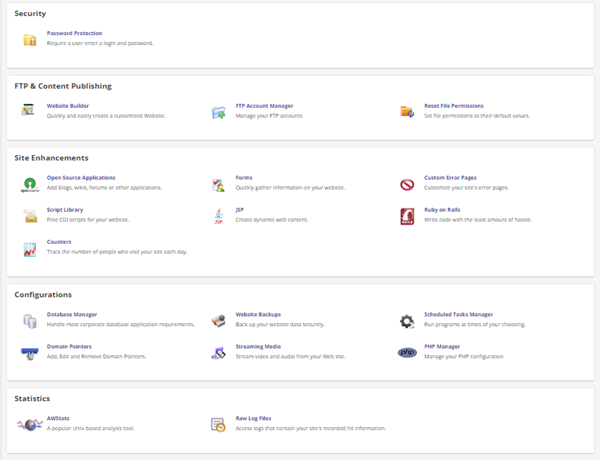
WestHost provides a migration center, which includes detailed instructions and steps to migrate your site either manually or through their tools. This service aims to assist users in moving websites with as little hassle as possible. Web.com lacks a dedicated migration tool, and it’s unclear if they offer migration services without additional fees.
Web.com offers extensive resources via its knowledge base and help center, including articles, blogs, guides, and 24/7 support through multiple channels. Users can access detailed instructions and support for various technical questions. WestHost also provides a comprehensive help center with detailed sections covering various aspects of hosting and website management, alongside 24/7 support through live chat and tickets. Both providers emphasize the importance of accessible support, but WestHost seems to offer a more detailed and categorized resource base.
User management
accessibility.
Score Components:
- Role customization (40%): Flexibility in creating and defining user roles and
permissions. - Ease of management (30%): User interface and tools for managing users.
- Access control (20%): Effectiveness of access control measures for different user
levels. - Scalability (10%): Ability to manage a growing number of users efficiently.
 7.3
7.3
 7.2
7.2
🏆 Winner Web.com: Web.com offers a strong suite of user management features ideal for various needs.
Both Web.com and WestHost provide structured approaches to managing user roles, permissions, and accessibility. Web.com supports two main user roles: Admin and Tech. Admins have extensive control over the account, including adding, editing, and deleting contacts, along with managing products, services, and billing info. Tech users, on the other hand, have limited permissions, focusing mainly on managing products and services. WestHost, meanwhile, offers email and FTP user roles. Email users are designed for those needing domain email addresses, and FTP users can gain access to specific directories and manage files within the web space. Web.com’s clear delineation of user roles with administrative capabilities contrasts with WestHost’s more segmented email and FTP access.
The user interfaces and tools provided for managing users in both platforms are straightforward. Web.com uses a centralized Account Manager with easy navigation through user icons to manage various aspects of the account, including billing, renewal settings, and adding alternate contacts. WestHost employs a Site Manager where users can add, edit, or delete user accounts efficiently. The interface for Web.com emphasizes emergency management across different accounts accessed from a primary dashboard, whereas WestHost focuses on simplicity for creating and managing email and FTP accounts.
When assessing access control, Web.com is strong in allowing admins to delegate specific roles and manage multiple user invites through a structured process. This is beneficial for growing businesses needing to manage several users with differentiated roles effectively. WestHost’s approach involves direct control over email and FTP usage, allowing more granular access management but is somewhat less flexible for large-scale operations. Web.com’s ability to define clear-cut roles for users within a growing organization is pivotal, while WestHost caters to a more straightforward user addition and access scenario.
Web.com user roles table:
| Role | Description | Access highlights |
|---|---|---|
| Administrative (Admin) | Manages account aspects, including contacts, products, services, and billing. | Can add, edit, or delete contacts; manage products/services; edit billing information. |
| Technical (Tech) | Handles managing products and services with limited permissions. | Restricted to managing products/services; cannot edit billing info or add other users. |
WestHost user roles table:
| Role | Description | Access highlights |
|---|---|---|
| E-mail User | Receives emails, associated with domain accounts. | Default email address setup; multiple aliases. |
| FTP User | Accesses specific directories within web space. | Can manage files; option to set directory limits. |
Customer support
hosting provider.
Score Components:
- Support communication channels (30%): Measures the variety of customer support types
provided (live chat, chatbot, email, phone, etc.) - Availability (20%): Assesses the availability hours for each channel, including 24/7
support options. - Technical support quality (30%): Assesses whether the provider offers comprehensive
technical support, including hardware upgrades (e.g., HDD to SSD), software installations, and web
server configuration changes. - Enterprise support (20%): Checks if there are dedicated or priority support services
for enterprise-level customers.
 8.2
8.2
 7.7
7.7
🏆 Winner Web.com: Offers a comprehensive suite of support options and 24/7 technical assistance.
 |
 |
|
|---|---|---|
Phone support |
||
Live chat support |
||
Chatbot |
||
Email/ticket support |
||
Enterprise support (dedicated agent, priority support) |
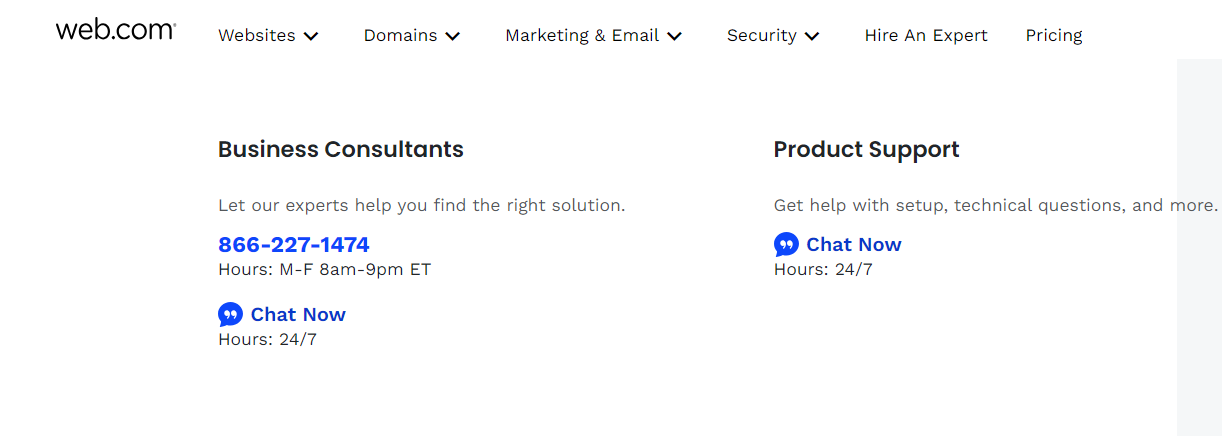
Web.com and WestHost both provide extensive customer support services, accessible through various channels. Web.com offers phone support with specific numbers for business consultants and general inquiries, backed by 24/7 technical support. Their comprehensive approach includes phone, email, live chat, and ticket system options, ensuring customers can always find the help they need. Moreover, their support is continually monitored, making sure no query goes unanswered.

WestHost also offers several support channels, including 24/7 live chat and multiple email addresses for different departments. While they provide extensive support for a range of issues related to web hosting and management, user reviews indicate mixed experiences with response times. WestHost’s in-depth knowledge base and blog are useful for self-service, though delays in support for more complex issues have been noted. Overall, both hosts are committed to user support, with Web.com slightly edging out due to its higher user rating and round-the-clock technical support.
Web.com vs WestHost: User feedback
Overall, users appreciate the hosting provider for its comprehensive service that includes domain purchasing, website hosting, and development, making it a convenient one-stop solution. However, there are concerns about limitations on hosting unlimited domains, which can be a significant drawback for users managing numerous websites. Additionally, the cost of individual website software is considered prohibitive by some, especially for those who already have lifetime licenses for third-party software. Despite these issues, the service is generally seen as satisfactory.
Users find WestHost to be a reliable hosting provider with minimal downtime and high-quality support. The competitive pricing is appreciated, but many users express frustration with the outdated documentation and the need for customer support intervention for tasks like updating SSL certificates. While the service itself is smooth and hassle-free, the administrative interface and outdated guides significantly detract from the overall user experience.
Web.com vs WestHost: FAQ
Which platform is better suited for hosting WordPress websites?
Both Web.com and WestHost offer managed WordPress hosting with automatic updates and robust support, making either a viable option. The choice depends on user needs like advanced features and scalability for WestHost or simplicity and ease of use for Web.com. Both platforms effectively tie in this category.
Are both platforms suitable for beginners?
Yes, both platforms cater well to beginners. Web.com offers an easy-to-use drag-and-drop website builder and straightforward setup, making it especially accessible. WestHost also provides user-friendly tools and extensive support, though its advanced features might appeal more to users with some technical know-how.
Which platform offers better customer support?
Web.com offers comprehensive customer support accessible via phone, email, live chat, and a ticket system, with 24/7 technical assistance ensuring constant availability. WestHost provides similar support channels but has mixed user reviews about response times and outdated documentation, making Web.com slightly better in this category.
Which hosting service offers more scalability options for growing websites?
WestHost offers more scalability options, providing flexible VPS hosting packages that can easily be upgraded to meet growing demands. Web.com supports scalable solutions within its shared architecture but lacks detailed information about elastic scaling or dedicated server options, making WestHost the more straightforward choice for scalability.
Which service is more suitable for hosting a high-traffic website?
WestHost is better suited for hosting high-traffic websites due to its dedicated and cloud hosting options that offer scalability and higher performance. Its advanced features and global data centers ensure reliable and robust hosting solutions suitable for accommodating heavy traffic effectively.
The making of this blog
We followed a clear, step-by-step process to write and research this article.












